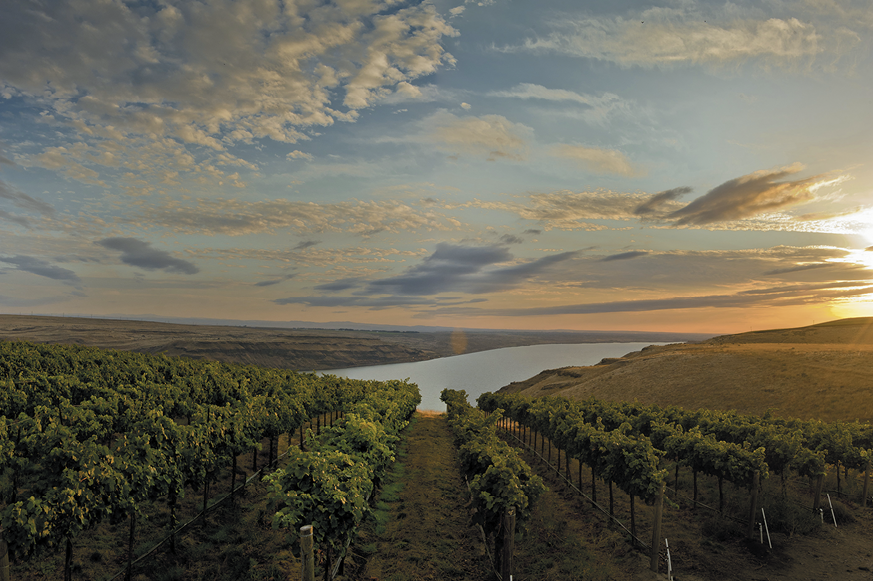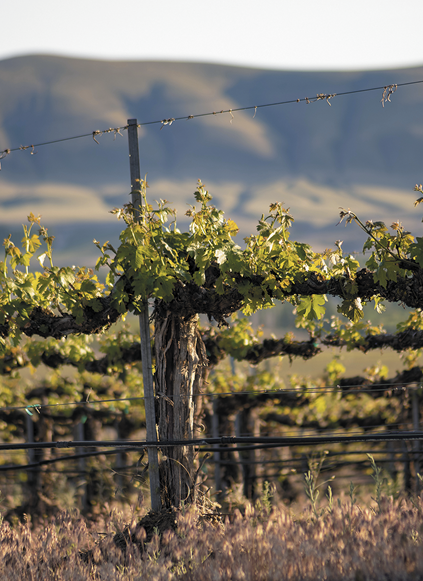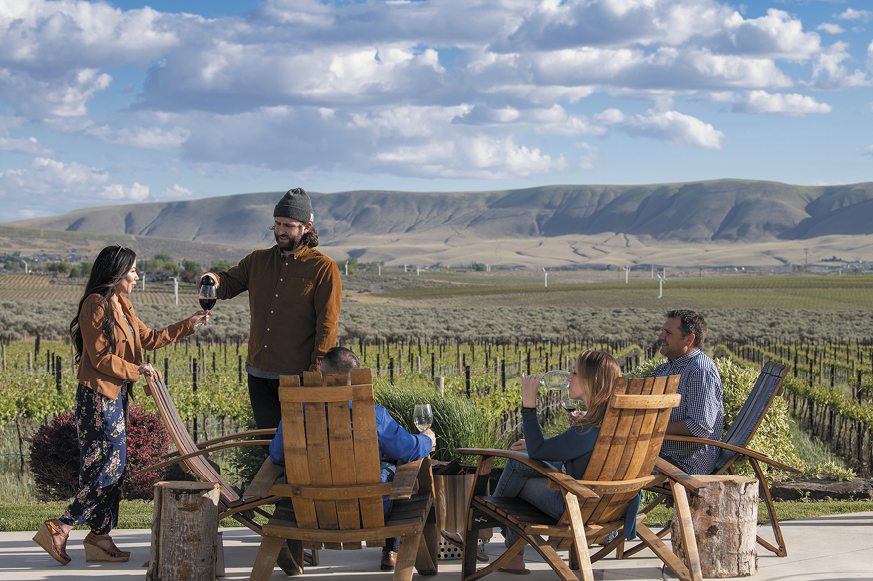- Home
- Media Kit
- MediaJet
- Current Issue
- Past Issues
- Ad Specs-Submission
- Reprints (PDF)
- Photo Specifications (PDF)
- Contact Us
- PRIVACY POLICY
- TERMS OF USE
![]()
ONLINE
![]()
ONLINE

A Collaborative Pursuit From Grapes To Glass
Editors’ Note
Kristina Kelley comes to the Washington State Wine Commission after spending more than 25 years with E. & J. Gallo Winery in roles in sales, premium marketing, and most recently as Senior Director of Public Relations and Corporate Communications. She retired from her full-time position in 2021 to relocate back home to Washington, but was retained as a strategic marketing communications consultant across a luxury portfolio of wine. Kelley has strong ties to the Pacific Northwest, having worked in Washington two different times over the course of her career and owning a vineyard for 18+ years in Oregon’s Dundee Hills. She is a Certified Specialist of Wine (CSW) of the Society of Wine Educators and has a degree from Virginia Commonwealth University.
Organization Brief
Washington State Wine Commission (WSWC) represents every licensed winery and wine grape grower in Washington State. Guided by an appointed board, the mission of the WSWC (washingtonwine.org) is to drive growth of Washington wine through marketing, communications, and viticulture and enology research. Funded almost entirely by the industry through assessments based on grape and wine sales, WSWC is a state government agency, established by the legislature in 1987.

Benches Vineyard, Horse Heaven Hills AVA, Washington
Will you discuss your career journey?
As the Executive Director of the Washington State Wine Commission, I’m privileged to lead a dedicated team responsible for the marketing, communications, special events, and branding of Washington wine and its regions, and viticulture and enology research. My journey in the wine industry spans my entire career, offering me a comprehensive understanding of the many facets of the industry. Before the Wine Commission, I spent more than 25 years with E. & J. Gallo Winery in sales, leadership roles in premium and luxury marketing, public relations, and corporate communications, as well as five years in sales in the Wine Division of Brown-Forman. In addition to my professional endeavors, my husband and I owned a vineyard for over 18 years in Oregon’s Dundee Hills, further deepening my connection to the industry. I hold the designation of Certified Specialist of Wine, have served as a Board Member of Women of the Vine & Spirits, and am currently on the board of the Auction of Washington Wines.
Will you highlight the history of Washington State Wine Commission and how the Commission has evolved?
Established in 1987, the WSWC emerged during a pivotal time in Washington’s wine industry, as our state began to garner recognition for its exceptional wines and unique terroir. From our inception, the WSWC has been dedicated to promoting and supporting Washington wines on both domestic and international fronts. Initially focused on marketing and education, we worked tirelessly to raise awareness of Washington’s diverse wine offerings and establish our state as a premier wine-producing region.
Our journey didn’t stop there – over the years, the WSWC has evolved in response to the changing needs of this dynamic industry. One significant aspect of this evolution has been sustainability. In 2022, we worked with our industry partners to help launch Washington’s first statewide sustainability certification for wine grapes, Sustainable WA. More than 20 years in the making, Sustainable WA is a third-party certification that ensures the industry will be environmentally sound, socially equitable, and economically viable for generations to come. Now in 2024, as part of the updated Sustainable WA Standard, vineyards in the program have the option of obtaining dual certification for both Sustainable WA and Salmon-Safe, provided all standards are met.
Another aspect of evolution: our increased investment in viticulture and enology research. Recognizing the importance of scientific innovation and sustainability, we partner with Washington State University researchers to spearhead important initiatives aimed at improving grape growing and winemaking practices, enhancing quality and reducing environmental impact. The WSWC has been a steadfast advocate for Washington’s wineries and growers through collaboration with industry stakeholders and government agencies who shape policies and regulations that support the growth and prosperity of our industry.
We’ve also embraced the role of promoting wine tourism and enhancing the visitor experience at Washington wineries and tasting rooms to further showcase the beauty and diversity of our wine region and attract visitors from near and far.

Kiona Estate Vineyard, Red Mountain AVA, Washington
How do you define WSWC’s mission and purpose?
At the heart of WSWC’s vision lies a simple yet powerful aspiration: to see Washington wine on every table. The WSWC stands as a dedicated state agency, representing the collective efforts of Washington’s wineries and growers. Our mission is clear: to foster the growth of Washington State wine through comprehensive initiatives in marketing, communications, and cutting-edge viticulture, and enology research. Rooted in a foundation of passion, trust, and collaboration, Washington State wine embodies the spirit of discovery, innovation, and curiosity. We invite all to explore the rich tapestry of Washington State’s wine offerings, reflecting our commitment to diversity and quality.
What do you see as the strengths of Washington State as a wine region?
First, our diversity and unique terroir sets us apart. From the volcanic soils of the Columbia Valley to the cool, maritime-influenced vineyards of the Puget Sound, Washington offers a remarkable range of microclimates and soil types. While Cabernet Sauvignon is our leading grape variety, this range allows us to grow a wide array of grape varieties (80+) with exceptional quality and complexity.
Also, our climate is a winemaker’s dream. With long, sunny days and cool nights during the growing season, we enjoy the perfect balance of ripeness and acidity in our grapes. This results in wines that are both ripe and vibrant, with intense flavors and lively acidity – a hallmark of Washington State wines. This ideal climate leaves room for experimentation whether it’s with new grape varieties or pushing the boundaries of winemaking techniques – our winemakers are constantly striving to elevate the quality and diversity of Washington State wines.
Another strength lies in our commitment to sustainable and innovative winemaking practices. Many of our wineries are leaders in sustainability, implementing practices such as organic farming, water conservation, and renewable energy. This dedication not only preserves our environment, but also enhances the quality and purity of our wines.
Also, our region benefits from a supportive and enthusiastic wine community. From wine enthusiasts and sommeliers to distributors and retailers, there’s a genuine excitement surrounding Washington State wines. This support not only fuels our growth, but also fosters a sense of camaraderie and pride among everyone involved in the industry.

Fidélitas Estate, Red Mountain AVA, Washington
Will you provide an overview of WSWC’s focus on viticulture and enology research?
The viticulture and enology research program at Washington State University is a cornerstone of the state’s wine industry, representing the collaboration between wine grape growers, wineries, and researchers. Supported by funding from all grape growers and vintners in the state, this program stands out as one of the few in the world driven by the collective vision and needs of the wine community. With a clear focus on industry guidance and accessibility, the research conducted here serves as a vital resource for all – regardless of size. By harnessing the combined power of resources, expertise, and community engagement, Washington’s wine research program is dedicated to advancing the quality and sustainability of the region’s viticulture and enology practices. At the heart of this endeavor lies the Ste. Michelle Wine Estates WSU Wine Science Center, a world-class facility dedicated to providing data-driven tools and innovative solutions to support Washington’s pursuit of premium grape growing and winemaking. Through these efforts and a deep commitment, the program strives to empower Washington’s wine industry to continue producing some of the finest wines in the world.
What attracted you to a career in the wine industry and what has made the industry so special for you?
I was drawn to the wine industry by its unique blend of art, science, and culture. My love for different cultures started in my childhood when my family traveled extensively overseas. This early exposure to various flavors and cultures laid the foundation for a lifelong appreciation of food, wine, and the surrounding cultural elements that make them so engaging.
What truly makes the wine industry unique is its sense of community. I have deep roots in the Pacific Northwest, and Washington State is my home. The Northwest is blessed with diverse agricultural products, with wine and food at the forefront. There’s something gratifying about working in a community that focuses on the land, cultivating grapes, and crafting wines that capture a sense of place. Something we lose sight of is that, behind every single bottle of Washington wine, it is not just one person, but a community.
Washington State wine abides by the saying: “a rising tide floats all boats.” That’s because Washington State wine is a collaborative pursuit from grapes to glass. There is plenty of personality, character, and expression in Washington State wine. Plus, there’s always something new to learn – whether it’s about winemaking techniques, grape varieties, or emerging trends in the market. Overall, the wine industry has offered me a fulfilling career where I can combine my love of culture and wine with my appreciation for craftsmanship and connection. It’s an industry that continuously inspires and challenges me, and I feel fortunate to be a part of it.![]()